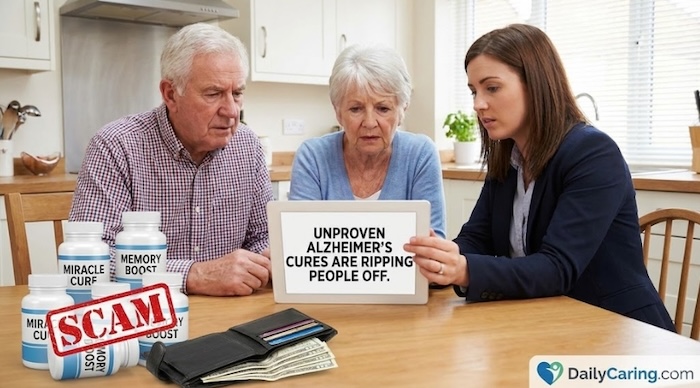Dementia can cause confusion, resistance, or even fear around taking pills, making a simple task feel overwhelming.
To help reduce stress for caregivers and their loved ones, we’ve gathered 11 practical and compassionate ways to encourage medication compliance – from disguising pills in favorite foods to establishing calming routines. These tips can help make the process smoother, safer, and less frustrating for everyone involved.

People with Dementia May Refuse to Take Medication
Getting someone with Alzheimer’s disease or dementia to take their medicine can be an ongoing challenge for many caregivers.
Refusing to take medication could be a response to being confused or feeling afraid of what they’re being asked to do.
An older adult might also feel a lack of control over their life, which could make them generally angry or resistant.
To make this vital task easier and less stressful, we’ve got 11 tips for overcoming challenges and convincing someone to take their medicine.
11 Ways to Get Someone With Dementia to Take Medication
1. Create a calm and quiet environment
When it’s time for medication, start with a relaxed environment.
Make sure there aren’t any loud sounds, such as the TV, or commotion, like many people around. You could also try playing soft, soothing music.
Before you start, take some deep breaths and do your best to stay calm throughout the process.
If you’re agitated, frustrated, or angry, they’ll likely sense it, which can make them more agitated and less likely to cooperate.
2. Be alert to side effects that make them feel sick or uncomfortable
Someone might refuse to take their medicine if it makes them feel sick or uncomfortable, or if they are ill.
Many medications cause unpleasant side effects like nausea, stomach aches, agitation, or dizziness, and your older adult might not be able to tell you that there’s a problem.
If you suspect this is the issue, speak with your doctor about addressing it.
They may also have other conditions, such as dental problems that cause gum or tooth pain, poorly fitting dentures, a urinary tract infection, a cold or flu, or a sore throat.
3. Eliminate medications or supplements that aren’t necessary
Many seniors take multiple medications. Sometimes doctors forget to review medications to see if they’re still needed regularly.
The last thing you need is to try to get your loved one to take more pills than necessary.
Speak with their doctor to determine whether any medications are no longer needed and can be safely discontinued.
Fewer pills = less hassle of taking medicine.
4. Make pills easier to take
Some pills could be too large and hard to swallow.
Talk with your loved one’s doctor or pharmacist to see if their medications could be changed to a liquid formula or if you could crush the pills and add them to applesauce, yogurt, or food.
Make sure to ask before crushing any pills because not all tablets are crushable. Some can become less effective or even unsafe.
5. Use short sentences and don’t explain or reason
Please don’t get into a conversation about why they need the medication or explain why it’s essential that they take their pills.
Reasoning with someone with dementia doesn’t work. Instead, use short, direct sentences to help them accomplish the goal.
For example, you could hand them the pill, demonstrate what you want by putting a pretend pill in your mouth, wait patiently for them to put their pill in their mouth, then say, “Big drink of water.”
6. Look for things that trigger distress
Sometimes other things about taking medication can upset someone with Alzheimer’s or dementia.
For example, they could feel distressed when they see a lot of pill bottles. In that situation, you could keep their medication bottles out of sight and only bring out the pills they need to take at that moment.
Similarly, if seeing all the pills they need to take makes them anxious, you could give them only one pill at a time and keep the rest out of sight.
7. Be their medication buddy
Taking your own medicine at the same time they do can make it more of a buddy experience. You might say, “It’s time for our medicine. Here’s mine and here’s yours.”
If you don’t take any medications, see if you can get away with “taking” a harmless food item like an M&M or a Tic Tac candy.
8. Don’t force it, try again in 10-15 minutes
Sometimes, there’s nothing you can say or do to get aging adults to take their medication.
If that happens, don’t try to force it. Leave them alone for a bit so you can both calm down. In 15 minutes (or so), give it another try.
9. Find the right time of day
People with dementia often have “good” and “bad” times of day. Trying to give medicine during one of their bad times isn’t likely to work.
For example, if your older adult typically gets sundowning symptoms, avoid giving medication in the late afternoon or evening unless the doctor requires it for an essential medical reason.
Think about the times of day when they’re in the best moods and adjust their medication schedule to meet those times.
Before making any changes to their medication schedule, patients should consult their doctor to ensure the new schedule is safe and will not cause any problems.
10. Stick to a daily routine
A daily routine can make a significant difference for someone with dementia.
With a consistent medication schedule, your loved one will likely adapt and become more cooperative over time.
Give them their pills at the same time every day. Do it in the same place, such as while relaxing in their favorite chair, and use the same cup for water.
Making medication part of their after-meal routine works well for some people because they’re still in “eating mode.”
11. Offer a treat
Young or old, we all love treats. You might consider offering a treat as a reward for taking their medication.
For example, put a small piece of chocolate in front of your care recipient and say it’s their treat after they finish their pills.
It might even help mask the medicine’s bitter taste and associate it with something positive.
Final Thoughts About Convincing Someone with Dementia to Take Their Medication
Getting a loved one with dementia to take their medication is far more than a simple daily task—it’s an exercise in patience, empathy, and creative problem-solving. When met with resistance, remember that the “no” is often rooted in fear, confusion, or a loss of control, not defiance.
By shifting your approach from a power struggle to a partnership and using these 11 compassionate strategies, you can transform a stressful confrontation into a moment of connection and care. The goal is to ensure they get the medicine they need while preserving their dignity and your relationship.
With persistence, kindness, and a willingness to try different techniques, you can find a routine that works, bringing peace of mind and improved health to both of you.
Disclaimer: The content provided here is for informational and educational purposes only and is not a substitute for professional medical advice. Do not start, stop, or change any medication or dosage without first consulting the prescribing physician or a qualified healthcare professional who is familiar with your specific health situation. Individual medical decisions should always be made in partnership with your doctor.
Recommended for you:
- Responding to 4 Common Dementia Accusations: Stealing, Poisoning, Being Held Prisoner
- 6 FDA-Approved Medications for Alzheimer’s Treatment
- Solve Challenging Alzheimer’s Behaviors with Expert Communication Tips
About the Author

Connie is the founder of DailyCaring.com and was a hands-on caregiver for her grandmother for 20 years. (Grandma made it to 101 years old!) She knows how challenging, overwhelming, and all-consuming caring for an older adult can be. She also understands the importance of support, especially in the form of practical solutions, valuable resources, and self-care tips.













I’m a caregiver for my mom who is a healthy 96 with Alzheimer’s and dementia. She definitely needs her medication ( 3 tiny pills ) daily! Without it she can have manic episodes up all night and panicking about going somewhere. Her medication keeps her pleasant and content. She is sometimes willing to take her medication, but often she will hide it in her mouth to discard it later when no one is looking. She can do this even after drinking a whole glass of water. I know because I use to find the pills later on the floor, between a cushion or somewhere in her clothing. She loves ice cream , but removes anything foreign. So I buy chocolate cover ice cream bars that have a rough textured chocolate covering. I remove a piece of chocolate from the top and then embed the medication into the ice cream . She bites it and must think that the things her tongue touches are all part of that crunchy chocolate covering. I still watch her to assure myself that she doesn’t spit anything out. Hope this might be of help to someone.
my alz patient occaionally refuses pills, and tells me to take them. her daughter changed the time to before meals so she’s primed to be eating and taking these first.
on their wanting to control pill box: provide fake pills in box to give them control of pills, swapping out the days real pills each time. I tell patient the eye drops have to go into the frig when she wants to keep them and she accepts this.
Could you petition the drug companies to make gummies for everything? that would solve many problems and we could ‘have a treat’ together instead of medicine.
What about that stuff that thickens liquids for people that have trouble swallowing?
handing out one pill at a time is great! they do get overwhelmed with many pills. and thanks for telling people to eliminate meds. There is no point in taking excess vitamins at this time.
Great tips, thanks for sharing! It’s a wise idea to change the timing to match when she’s ready to eat. And to give her the feeling of control with the fake pills and the fib about the eye drops.
It would be fantastic if all medications could be made in more tasty formats like gummies. Unfortunately, many likely wouldn’t be effective or safe when taken in that manner. However, you may want to speak with the pharmacist to find out if any of her medications could be prepared in different ways to make them taste better or easier to take. For example, if it’s a liquid medication, sometimes flavoring can be added to make it taste good.
For people with trouble swallowing, pills that can be crushed (check with doctor or pharmacist first due to safety and efficacy issues for some meds) can be mixed in with a little bit of applesauce to make them easier to swallow. Liquids can likely be thickened with products like Thick-It – but always check with doctor or pharmacist before modifying any medication.
So glad our suggestions have also been helpful!
I found that at timer pillbox such as the LiveFine Automatic Pill Dispenser, though expensive, has been a godsend for family. The cover locks, so pills can’t “spill” or be “tampered”. It has a fairly loud signal/alert so people can hear and will ring up to 30 min before stopping. It will rest itself once the pills are taken and my family member could only access the specific pills necessary at the accurate time. They are quite expensive ranging from 69 – 89 + dollars dependent on where your order (I got mine on Amazon) but we all chipped in (kids) and bought it. I has worked consistently for 2 years at this time without any issues or any missed pills. LOVE IT!!
Thanks for sharing your experience! We’re so glad that this timer pillbox works so well for your family member.
I have visited my Aunt at residential care home. I noticed care giver placing pills directly on tongue with her finger tips. Care giver is holding other pills in her palm. She asks my Aunt to swallow and show her she has swallowed by saying ah. Over my shoulder another care giver is saying she didn’t swallow cause he sees her hiding it with her tongue. Weirdest experience I’ve ever had.
That does sound like a strange and unsanitary technique for a care staff member to be using.
My sister had a stroke but since then she refuses to swallow her pills even if given in pudding, honey or jello. She will hold it in her mouth for a long time and eventually spit it out. I have thought about plugging her nose so the has to swallow so she can breathe but I’m afraid someone will accuse me of abusing her. What do you think?
You mean well, but that sounds like a dangerous strategy as well as being abusive. She could choke or aspirate, which would likely cause serious health problems.
Hopefully, using some of the suggestions above will help. Often, if you crush the medication (assuming the doctor or pharmacist says it’s still effective when crushed) and stir it into a small amount of food with a stronger flavor, the person won’t notice that it’s in there.
You could also speak with the pharmacist to see if there’s a different formula for the medication that might make it easier to hide, like a liquid.
My mom recently had a stroke in Feb 2022 and same thing she hold medications in mouth. She has gone so angry and think we’re doing things to hurt her. It has been so hard this past couple of months.
We’re sorry to hear about this situation and hope that the suggestions in this article are helpful.
I am a CNA that takes care of patients with Dementia everyday. It’s a battle for them and all you gotta do is not change their routine on a day to day basis.keep them as calm as you can and put yourself in their shoes !! It’s a disease that a lot of will encounter eventually without any knowledge of it .. love them and treat them as you would your own !!! ♥️♥️♥️♥️♥️I love my job!!
Wonderful advice! Your patients are lucky to have someone as kind and compassionate as you to care for them 💜
I do need more tips to help my wife to take medications
We hope the suggestions above are helpful!
good morning. Unsure if after 2 years this message will still be pertinent. But, I do encourage you to look for TEEPA SNOW’s technique, the HAND UNDER HAND. If after trying all the above tricks, still not helping, look in for her trick. It does fantastic with many other tasks that you may need to do for your loved one.
Take care. good luck! Anne Marie
Excellent suggestion, thanks for sharing!
Here’s a video that shows Teepa Snow’s hand over hand technique – https://www.youtube.com/watch?v=Wn1OEfQt0ow
I have been taking care of my mother who has dementia for the past 3 years now she’ll be 83 in July it’s to the point to where she doesn’t move around much and now she has contracted a couple of bed sores what is the best medication to use for bed sores
It’s important to contact your mother’s doctor right away to ask them about proper treatment for her bed sores. If not treated properly, they can become serious or life-threatening.
We’ve got a couple of articles with more information about bed sores:
— 3 Helpful Tips for Bed Sores Prevention and 2 Common Treatments https://dailycaring.com/3-helpful-tips-for-bed-sores-prevention-and-2-common-treatments/
— Bed Sores 101: Causes, Stages, and Early Detection https://dailycaring.com/bed-sores-101-causes-stages-and-early-detection/